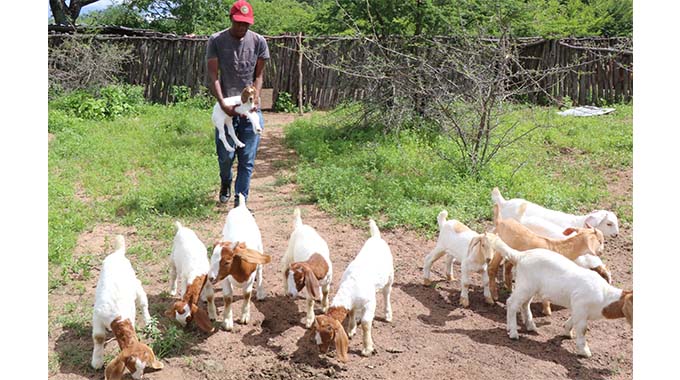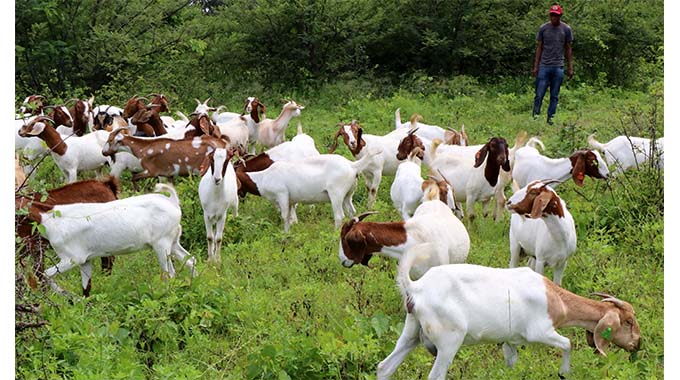
Mashudu Netsianda/Bridget Sibanda, Chronicle Reporters
WHEN Mr Xolisani Mpofu imported a couple of Boer bucks from North West province in South Africa a few years ago, little did he know that three years later he would be rated among some of the country’s leading goat breeders.
Mr Mpofu, who is based in South Africa, is involved in a thriving Boer goat breeding project deep in rural Inyathi in Bubi district, Matabeleland North province.
Boer goats were developed in South Africa in the 1900s from a cross of indigenous goats and Indian or European goats and are bred mainly for meat.
Mr Mpofu runs a similar project in the neighbouring country, which he decided to replicate back home in 2015 as an experimental enterprise.
Mr Mpofu started with only 10 goats of the local breed as a pilot project at his father’s plot in Nyamandlovu.
In 2018, he was offered a piece of land in Inyathi measuring 100 hectares and that is when he decided to venture into commercial Boer goat breeding.
He said when he started the project, he was inspired by the desire to make a meaningful contribution to his community and the country at large.
“When someone offered to lease out his farm in Inyathi I grabbed that opportunity with both hands. In 2018, that is when I decided to introduce Boer goats breeding, although I was not even sure whether it would be a success given that it was something, which was virtually new in Zimbabwe,” he said.
“I brought in two Boer bucks from South Africa so that I could cross-breed them with local ones. It was very successful and today I have about 100 cross breed Boer goat breeds.”
Cross breeding is the process of breeding with the intention to create offspring that share the traits of both parent lineages or to produce an animal with hybrid vigour (the improved or increased function of any biological quality in a hybrid offspring).
 Mr Mpofu has a total of 257 goats, most of which are expecting and he anticipates to get at least 150 kids by April this year.
Mr Mpofu has a total of 257 goats, most of which are expecting and he anticipates to get at least 150 kids by April this year.
“The Boer goat is a non-seasonal breeder, which is suitable for most management systems. Multiple births are the norm, with triplets and quadruplets being fairly common and the ovulation rate ranges from one to four eggs per ewe with an average of 1,7,” he said.
Mr Mpofu has managed to carve a niche in the market. Last year he sold 174 Boer goats realising more than US$20 000.
“I actually specialise in breeding Boer goats for sell to other local farmers. The breeding farmers usually look to Boer goats to improve the quality of their goats. The goats that do not qualify for breeding material are the ones that we sell for meat,” he said.
“Goats for meat are usually sold for about US$50 while those for breeding purposes can fetch up to US$500 depending on the size and quality. They also produce high-butterfat milk.”
Mr Mpofu said his project operates under the names “Zakithi Boer Goat Stud BG8” in Zimbabwe and “Eland Zakithi Boer Goat Stud 1899” in South Africa.
 Mr Mpofu said the major challenges they encounter in breeding Boer goats include diseases like heartwater, which is one of the deadliest diseases in goats.
Mr Mpofu said the major challenges they encounter in breeding Boer goats include diseases like heartwater, which is one of the deadliest diseases in goats.
“To deal with this disease, we inject the goats with an antibiotic called oxytetracycline every 28 days including a weekly dipping, particularly when the tick count is high,” he said.
“Goats have a bad relationship with worms and therefore de-worming is also part of an important routine exercise. Goats also suffer from foot rot during the wet season hence a 15 minutes foot bath in copper sulphate or zinc sulphate for goats is carried out every week.”
Mr Mpofu said they also vaccinate the goats against pulpy kidney once a year.
“During the dry season, the veld will be dry with no food for the goats and therefore we have to buy supplementary feeding in the form of organic goat pellets, which is very expensive,” he said.
Boer goats are known to be hardy, but some keepers may experience increased struggles with internal parasites when raising these animals in hot climates. A Boer goat’s average life expectancy is between eight to 12 years.
Mr Mpofu’s younger brother, Qondisani assists in running the project in Inyathi where he employs at least five people.
Mr Mpofu said his long-term plan is to grow his business and be able to export goats to other countries.
He said in line with his vision of playing a significant role in the country’s economic growth, he intends to provide workplace learning to farmers interested in Boer goat breeding.
“I personally believe that as commercial Boer goat breeders, we should have an association, which will enhance our long-term goal of supplying quality goats in the country. It will also help boost our economy as we will be able to export,” he said.
